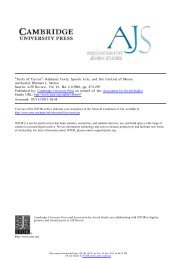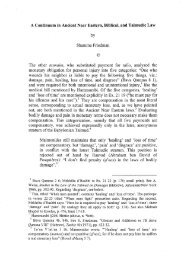Wimpfheimer_ Is it not so.pdf
Wimpfheimer_ Is it not so.pdf
Wimpfheimer_ Is it not so.pdf
You also want an ePaper? Increase the reach of your titles
YUMPU automatically turns print PDFs into web optimized ePapers that Google loves.
Toward a Poetics of Legal Narrative in the Talmud ❙ 67<br />
<strong>it</strong>s existence. ``Our teacher,'' they say, ``but <strong>it</strong> is negligence in the owner's presence.''<br />
At this comment, Rava is ashamed.<br />
Rava is <strong>not</strong> ashamed simply because he is wrong. His shame is the shame of<br />
one whose <strong>so</strong>ul is nakedly revealed. His students contextualize their teacher's<br />
comments and realize <strong>not</strong> only the existence of an error, but al<strong>so</strong> the rea<strong>so</strong>n the error<br />
has occurred. They are <strong>not</strong> only able to process the court case and <strong>not</strong>e all<br />
of <strong>it</strong>s subtleties; they are al<strong>so</strong> able to recognize the impact that their teacher's<br />
leanings have on his abil<strong>it</strong>y to adjudicate. Rava is ashamed because he has been<br />
contextualizedÐrendered part of the fabric of law that his students navigate their<br />
way around. Rava is ashamed because he has been historicized; his mistake suggests<br />
the beginning of his students' ascent, and his own antiquation.⁶⁸<br />
But this shame cuts deeper into Rava's per<strong>so</strong>nal<strong>it</strong>y. It moves away from<br />
intellectual lim<strong>it</strong>ations and towards the very essence of his activist work as a legistÐ<br />
his willingness to side w<strong>it</strong>h the weaker party. By <strong>not</strong>ing the economic empathy at<br />
the heart of Rava's activist jurisprudence, we understand the ruling against Bei<br />
¼ozai as a move in the oppos<strong>it</strong>e direction. Rava's privileging of negligence<br />
demonstrates that fault has become, for him, part of the fabric of lawÐa new<br />
statute. He is ashamed because he knows that his decision is based entirely on a<br />
legally formalistic focus on negligence as the benchmark of obligation. At the<br />
moment of shame, he knows that such formalism is the price that an activist judge<br />
<strong>so</strong>metimes pays when innovating w<strong>it</strong>hin the lawÐwhen the cost of shoring up one's<br />
credentials as a jurist by sticking to the law's letter is borne by a h<strong>it</strong>herto protected<br />
needy partyÐthe economically weaker shepherd, borrower, or renter. The students,<br />
having learned from their teacher, are surprised by this move; the empathic bent is<br />
<strong>so</strong> ingrained in them that they are puzzled by the ruling. Startled by a teacher who<br />
has replaced spir<strong>it</strong> w<strong>it</strong>h letter, they cry out publicly, humiliating the one who had<br />
modeled empathy for them.<br />
Rava's mistake is <strong>not</strong> a momentary amnesia, a forgotten principle leading to a<br />
wrong decision, but a methodological blunderÐa failure to weigh all aspects of the<br />
case that results in shame <strong>not</strong> just for Rava, but for justice <strong>it</strong>self. The compet<strong>it</strong>ion of<br />
concepts has <strong>not</strong> yet been won; the debate between owner presence and negligence<br />
has <strong>not</strong> yet been re<strong>so</strong>lved. Rava's students are reminders. They remind him of his<br />
lim<strong>it</strong>ations as an individual cog in the wheel of justice, of the idealism of his earlier

















